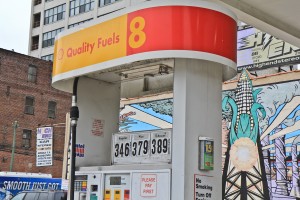AP: Environmental impacts of ethanol may outweigh the benefits
-
Katie Colaneri

Kimberly Paynter/WHYY
A Shell station at 12th and Vine Streets in Philadelphia offers gasoline mixed with corn-based ethanol and features a mural paying homage to corn.
Federal law has required American refiners to mix increasing amounts of corn-based ethanol into gasoline since 2007.
Ethanol is an alcohol that burns less carbon dioxide than refined petroleum products. The Obama administration has touted the Renewable Fuel Standard as an essential tool for bringing down greenhouse gas emissions.
But an Associated Press investigation published today reports the environmental impacts of the “corn boom” may be outweighing the benefits of the biofuel:
Five million acres of land set aside for conservation — more than Yellowstone, Everglades and Yosemite National Parks combined — have vanished on Obama’s watch.
Landowners filled in wetlands. They plowed into pristine prairies, releasing carbon dioxide that had been locked in the soil.
Sprayers pumped out billions of pounds of fertilizer, some of which seeped into drinking water, contaminated rivers and worsened the huge dead zone in the Gulf of Mexico where marine life can’t survive.
The consequences are so severe that environmentalists and many scientists have now rejected corn-based ethanol as bad environmental policy. But the Obama administration stands by it, highlighting its benefits to the farming industry rather than any negative impact.
The AP reports the ethanol mandate is also having a dramatic effect on the price of corn and the land it’s being grown on:
Leroy Perkins, the farmer agonizing about what to do with his 91 acres, says he likes ethanol as a product and an industry. But he knows it fuels the corn prices that are transforming his county.
“If they do change the fuel standard, you’ll see the price of corn come down overnight,” he said. “I like to see a good price for corn. But when it’s too high, it hurts everybody.”
Investors from as far away as Maryland and Pennsylvania have bought thousands of acres in Wayne County, sending prices skyrocketing from $350 per acre a decade ago to $5,000 today.
One in every four acres of in the county is now owned by an out-of-towner.
Pennsylvania Senator Pat Toomey has been pushing to repeal the law or at least cut back on the amount of ethanol the federal government requires refiners to blend into their supplies. On a visit to Delta Airlines’ refinery in Marcus Hook, Delaware County back in August, Toomey told reporters the law has damaging economic and environmental impacts.
“First of all, the original idea is this would be good for the environment,” Toomey said. “Except that everyone’s discovered that it’s counter-productive.”
Refineries can pay to opt out of the program by buying credits. The federal government increased ethanol mandate this year from from 13.2 billion gallons in 2012 to 13.8 gallons which also drove up credit prices. Toomey said it’s putting refineries like the one in Marcus Hook in the red.
“It costs them more to comply with this government mandate than all of the labor and all of the jobs that they have on this facility,” he said. “This makes no sense and as a result, this refinery is not profitable.”
Politico reports the EPA is expected to give refineries some relief when it announces the ethanol mandate for 2014 sometime this week.
















